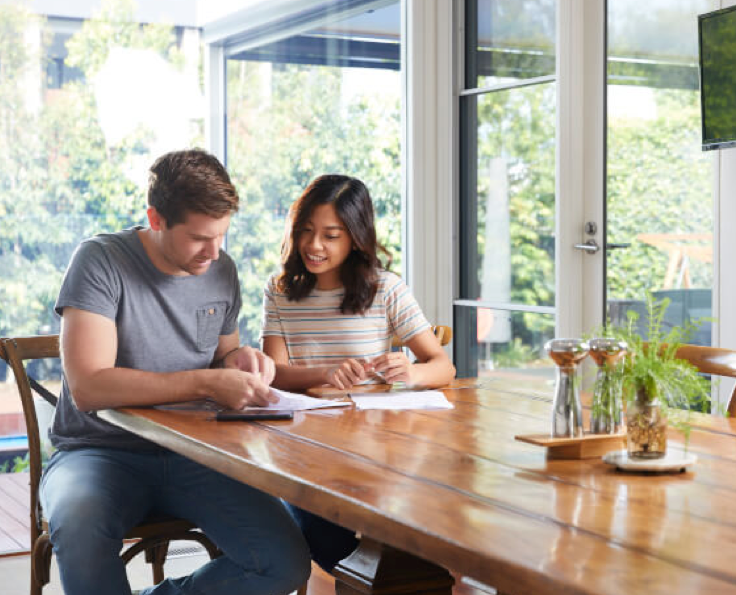Stamp Duty in New South Wales
Stamp Duty in New South Wales
*iSelect is the trading name of iSelect Mortgages Pty Ltd (ABN 86 148 217 181). iSelect Mortgages Pty Ltd is a credit representative (Credit Representative 400540) of Auscred Services Pty Ltd (Australian Credit Licence 442372). iSelect provides a referral to Lendi Pty Ltd, a Credit Representative of Lendi Group Finance Pty Ltd (Australian Credit License 442372). iSelect Mortgages Pty Ltd receives a commission from the Licensee for each new customer account created and for each home loan submitted through this service. Learn more.
Compare home loans the easy way
We partnered with Lendi* to help you compare home loans from over 25 lenders and over 2,500 home loan products.
What is stamp duty?
How much is stamp duty in NSW?
When do I need to pay stamp duty in NSW?
Do first home buyers have to pay stamp duty in NSW?
How much could the First Home Buyers Assistance Scheme save you?
Are there other stamp duty exemptions or concessions in NSW?
Do foreign buyers have to pay stamp duty?
Can I get a Home Loan that covers stamp duty?
Where can I find and compare Home Loans?
What is stamp duty?
Stamp duty, also known as ‘transfer duty’ in NSW, is one of the bigger expenses that comes with buying a property in Australia. (Well, besides actually buying the house.)
It’s basically a tax that state and territory governments charge on transactions like insurance policies, vehicle registration and mortgages.1Business.gov.au – Stamp duty When it comes to buying a property, the duty you’ll pay also varies depending on where you live, the kind of property you’re buying, and a whole bunch of other factors we’ve listed below.
How much is stamp duty in NSW?
In NSW, stamp duty gets calculated on either a property’s sale price or its current market value – whichever one is higher. However, this isn’t a one-size-fits-all kind of deal. There are also different thresholds that determine how much you’ll pay.
From 1 July 2023 to 30 June 2024, the following thresholds apply:2NSW Government Revenue – Transfer duty
| Property value | Stamp duty rate |
| $0–$16,000 | $1.25 for every $100 (minimum $10) |
| $16,000–$35,000 | $200 plus $1.50 for every $100 over $16,000 |
| $35,000–$93,000 | $485 plus $1.75 for every $100 over $35,000 |
| $93,000–$351,000 | $1,500 plus $3.50 for every $100 over $93,000 |
| $351,000–$1,168,000 | $10,530 plus $4.50 for every $100 over $351,000 |
| $1,168,000+ | $47,295 plus $5.50 for every $100 over $1,168,000 |
Residential Properties that are worth more than $3,505,000 also incur a premium duty rate. As of 1 July 2023, this rate sits at $175,830 plus an extra $7.00 for every $100 over $3,505,000.3As above
It’s also worth noting that these thresholds are adjusted every year based on inflation.4As above
Finally, if you have some kind of association with the seller – maybe they’re a friend or family member – then you’ll need to take an extra step. You’ll need to get a qualified professional to assess the value of the property.5As above It might be tempting to think of this step as just a formality, but extra information can’t hurt, right? This step might help you to make sure the transaction is fair for everyone involved.
When do I need to pay stamp duty in NSW?
In NSW, you usually need to pay stamp duty for most properties or land packages, including:6As above
- a residential property, whether it’s your main residence or your holiday home
- an investment property
- a farming property or vacant land
- an industrial or commercial property
- a business that includes the purchase of land.
If you acquire land (or an interest in land) without buying it, you’ll also need to pay transfer duty. This includes:7As above
- a declaration of trust (that is, a legal declaration that a property will be held by a trustee on behalf of a person or cause)8NSW legislation – Duties Act 197 No 123
- a gift
- a transaction that leads to a change in the beneficial ownership of a property. (A beneficial owner is someone who owns more than 25% and has the power to make decisions about a property.)9AUSTRAC – Beneficial owners
You’ll usually need to pay stamp duty within three months of signing a contract of sale or transfer for your property.10NSW Government Revenue – Transfer duty Generally, you’ll pay it at the same time as all the other costs involved in the settlement of the property. Your conveyancer or solicitor can help you out with this. If not, the NSW Government will still send you a ‘duties notice of assessment’ with all the details you need to pay via BPAY or bank transfer.
Do first home buyers have to pay stamp duty in NSW?
The short answer? It depends.
If you’re buying your first home in NSW, then you might be eligible for the First Home Buyers Assistance Scheme (FHBAS). Depending on how much the property costs, you might end up paying a reduced rate – or even nothing! – on stamp duty.11NSW Government Revenue – First Home Buyers Assistance scheme
Stamp duty also works a little differently depending on what kind of property you’re buying and the value of your property. As of 1 July 2023:12As above
- If you’re buying a house:
- properties valued less than $800,000 are exempt from stamp duty
- properties valued between $800,000 and $1,000,000 may qualify for reduced stamp duty.
- If you’re just buying land on which you intend to build a home:
- land valued less than $350,000 may be exempt from stamp duty
- land valued between $350,000 and $450,000 may receive reduced stamp duty.
Of course, before you can take advantage of these benefits, you’ll need to get approved for the FHBAS. To do so, you’ll need to lodge your FHBAS application form and your purchaser/transferee declaration form with your solicitor or conveyancer – along with documents to prove your identity.
How much could the First Home Buyers Assistance Scheme save you?
Let’s take a quick look at how much the FHBAS can slash from your stamp duty when you buy a new or existing house, shall we? Just keep in mind that these reductions are based on purchase price of the property, and the thresholds are as of 1 July 2023.
Source: NSW Government – Stamp duty axed for thousands of first home buyers from 1 July
Are there other stamp duty exemptions or concessions in NSW?
There are a few other, very specific, circumstances where you might also be able to get an exemption or a reduced rate on your stamp duty. These are related to property transfers that don’t involve actually buying a new house. They are:
- Inheriting a property: If you inherit your property from somebody who has passed away, your stamp duty could be reduced to $50. Of course, there are some exceptions here, but as long as the will isn’t contested, the reduced rate will likely apply.13NSW Government Revenue – Deceased estate transfers
- Transfers between couples: This applies to couples who are married, or de facto couples who have been living together for at least two years. If the property getting transferred between them is their family home, or a vacant plot of land where the family home will be built, then stamp duty won’t apply. However, after the transfer, the property needs to be held equally by both partners.14NSW Government Revenue – Family Transfers
- Transfers following relationship breakdowns: If a domestic relationship, a de facto relationship or a marriage ends, and the property gets transferred to a new owner, it might not attract stamp duty. This can be the case if it’s transferred to either of the partners, their children or a trustee of the children.15As above
Quick Tip:
You might not have to pay stamp duty if you’re refinancing your home. This involves replacing your old Home Loan with a new one, sometimes because you’ve found a lender with a lower interest rate, or because you want to use your home equity for a purchase.
However, if you’re increasing your loan amount or your loan amount is more than $1,000,000, you might be required to pay some stamp duty.NSW legislation – Duties Act 1997 No 123 If you’re unsure about what you’ll need to pay, try speaking with a mortgage broker.
Do foreign buyers have to pay stamp duty?
Yep! On top of stamp duty, the NSW Government also issues an extra surcharge purchaser duty. This is an extra 8% cost on either the purchase price or the value of the property – whichever one is bigger.16NSW Government Revenue – Surcharge purchaser duty
However, we should note that this only applies for residential property. For commercial properties, this extra duty might not apply, depending on the type of property and how it’s used.17NSW Government Revenue – Surcharge Purchaser Duty Guide
Can I get a Home Loan that covers stamp duty?
Lenders don’t typically cover stamp duty as part of a Home Loan. Some lenders might be willing to make an exception, though.
Where can I find and compare Home Loans?
If you’re looking at the cost of stamp duty in NSW, then chances are you’re also on the hunt for a Home Loan provider. And hopefully, we can help you out there!
Our team at iSelect have partnered with Lendi,* so we can help you compare Home Loans from a range of different providers. Best of all, our online comparison tool makes everything quick and easy. Take a browse and see if you can find a suitable loan for your homeownership dreams.

Get started on comparing home loans today!*
Find a home loan by comparing with iSelect’s trusted partner, Lendi.
*iSelect is the trading name of iSelect Mortgages Pty Ltd (ABN 86 148 217 181). iSelect Mortgages Pty Ltd is a credit representative (Credit Representative 400540) of Auscred Services Pty Ltd (Australian Credit Licence 442372). iSelect provides a referral to Lendi Pty Ltd, a Credit Representative of Lendi Group Finance Pty Ltd (Australian Credit License 442372). iSelect Mortgages Pty Ltd receives a commission from the Licensee for each new customer account created and for each home loan submitted through this service.
We'd love to know what you think of our website so we can improve it!
- 1.Business.gov.au – Stamp duty
- 2.NSW Government Revenue – Transfer duty
- 3.
- 4.
- 5.
- 6.
- 7.
- 8.NSW legislation – Duties Act 197 No 123
- 9.AUSTRAC – Beneficial owners
- 10.NSW Government Revenue – Transfer duty
- 11.
- 12.
- 13.NSW Government Revenue – Deceased estate transfers
- 14.NSW Government Revenue – Family Transfers
- 15.
- 16.NSW Government Revenue – Surcharge purchaser duty
- 17.NSW Government Revenue – Surcharge Purchaser Duty Guide

.svg)







